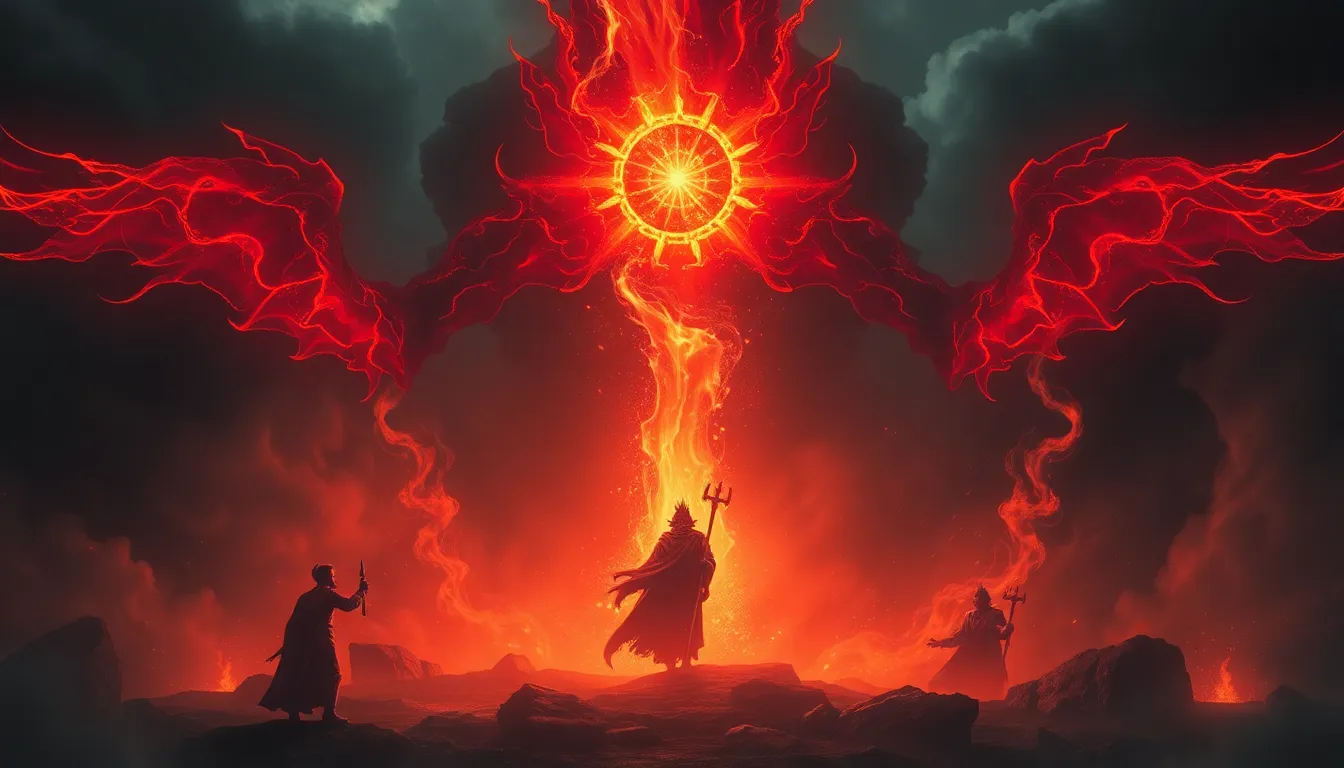When Mortals Cross the Line: The Terrifying Cost of Divine Punishment
I. Introduction
Divine punishment is a concept that transcends cultures and religions, representing the belief that higher powers impose consequences on mortals who transgress moral or divine laws. Across various societies, divine punishment manifests in myriad forms, often serving as a deterrent against immoral behavior. This article aims to explore the multifaceted nature of divine punishment, examining historical perspectives, psychological impacts, modern interpretations, and cultural variations, as well as the implications for morality and ethics.
II. Historical Perspectives on Divine Punishment
A. Ancient civilizations and their beliefs
Throughout history, ancient civilizations have crafted elaborate narratives around divine punishment. In Mesopotamia, for example, the gods were believed to impose harsh penalties on those who defied their will. The Greeks often told tales of hubris, where mortals faced catastrophic consequences for overstepping their bounds, as illustrated in the myth of Icarus. The Egyptians similarly viewed divine retribution as a means to uphold Ma’at, the principle of cosmic order.
B. Religious texts and interpretations
Religious texts across cultures emphasize the theme of divine punishment. In the Bible, the story of Noah’s Ark presents a dramatic instance of punishment for human wickedness. The Quran speaks of various communities punished for their disobedience to God’s commands. Similarly, Hindu scriptures narrate the consequences faced by figures who acted against dharma, the moral order.
C. Notable historical events attributed to divine retribution
Throughout history, there have been events that many attribute to divine punishment. From plagues and natural disasters to the downfall of empires, these occurrences are often interpreted as manifestations of a higher power’s wrath against societal moral failings.
III. The Psychological Impact of Belief in Divine Punishment
A. Fear as a motivating factor in moral behavior
The belief in divine punishment can induce a profound sense of fear, acting as a motivator for moral behavior. The prospect of facing divine retribution often compels individuals and communities to adhere to ethical standards and social norms.
B. Case studies: Individuals and communities responding to perceived divine punishment
Individuals and communities have reacted to perceived divine punishment in various ways. For instance, after natural disasters, some groups may interpret these events as signs of divine displeasure, leading to a renewed commitment to religious practices.
C. The role of guilt and shame in religious contexts
Guilt and shame are significant emotional responses tied to the belief in divine punishment. The fear of disappointing a deity or facing consequences can lead individuals to internalize these feelings, often resulting in a quest for redemption through religious observance.
IV. Modern Interpretations of Divine Punishment
A. The shift from traditional to contemporary views
In contemporary society, interpretations of divine punishment have evolved. While traditional views still hold sway in many cultures, modern perspectives often emphasize personal responsibility and psychological explanations for misfortune.
B. Influence of secularism and science on beliefs
As secularism and scientific understanding gain prominence, the literal interpretation of divine punishment is increasingly challenged. Many now seek rational explanations for events once deemed as divine retribution.
C. Examples of modern ‘divine punishments’ in popular culture and media
Modern media often reflects the idea of divine punishment through narratives in films, literature, and news stories, depicting characters facing consequences for their immoral actions, thereby reinforcing the age-old theme of retribution.
V. Case Studies: Mortals Who Crossed the Line
A. Historical figures punished for hubris
Figures such as Icarus and King Nebuchadnezzar serve as historical examples of individuals punished for their hubris. Icarus, who flew too close to the sun, faced dire consequences for his ambition, while Nebuchadnezzar was driven mad for his pride, illustrating the age-old lesson against overstepping one’s bounds.
B. Modern examples of perceived divine punishment in public figures
In modern times, public figures have also faced perceived divine punishment, often after engaging in morally questionable behavior. Scandals involving prominent leaders have been interpreted by some as a form of divine retribution.
C. Examination of societal reactions to these cases
Societal reactions to these cases can vary widely, with some viewing the punishments as a form of justice, while others may see them as an example of mob mentality or scapegoating.
VI. Moral and Ethical Implications of Divine Punishment
A. The question of justice versus mercy
The balance between justice and mercy is a central theme in discussions about divine punishment. Many grapple with the ethical implications of retribution versus the need for forgiveness and understanding.
B. The role of free will in moral decisions
Free will plays a crucial role in the discourse surrounding divine punishment. The ability to make moral choices implies that individuals are accountable for their actions, raising questions about the fairness of divine retribution.
C. Debates on the ethical considerations of divine retribution
Debates continue on whether divine punishment can ever be justified. Many argue that it contradicts the principles of compassion and understanding that many religions espouse.
VII. Cultural Variations in the Concept of Divine Punishment
A. Comparative analysis of Eastern vs. Western beliefs
Eastern and Western cultures exhibit notable differences in their understanding of divine punishment. While Western traditions often emphasize individual accountability, Eastern philosophies may focus more on collective karma and the cyclical nature of life.
B. Indigenous perspectives on punishment and justice
Indigenous cultures often have unique perspectives on punishment and justice, viewing the relationship between the spiritual and physical worlds as integral to understanding consequences.
C. The impact of cultural narratives on the understanding of divine retribution
Cultural narratives play a significant role in shaping beliefs about divine retribution. These stories often serve to reinforce moral codes and societal norms.
VIII. The Role of Religion in Enforcing Morality
A. How religious institutions interpret and communicate divine punishment
Religious institutions often interpret and communicate divine punishment in ways that serve to enforce moral behavior among their followers. Through teachings, rituals, and community guidance, these institutions shape the understanding of divine retribution.
B. The influence of religious leaders on public perception
Religious leaders wield significant influence over public perception regarding divine punishment. Their interpretations can either reinforce traditional views or encourage more contemporary understandings of morality.
C. Social consequences of challenging religious doctrines regarding punishment
Challenging established doctrines on divine punishment can lead to social repercussions, including ostracism, conflict, or reformulations of community beliefs.
IX. The Future of Divine Punishment in a Globalized World
A. The impact of globalization on traditional beliefs
Globalization has led to the blending of beliefs, impacting traditional understandings of divine punishment. As cultures interact, interpretations may shift, creating new frameworks for understanding morality.
B. The rise of interfaith dialogues
Interfaith dialogues are becoming increasingly important, providing platforms for discussing differing beliefs about divine punishment and morality, fostering understanding and tolerance.
C. The evolving landscape of morality in a diverse society
The evolving landscape of morality, influenced by diverse beliefs and practices, suggests that the concept of divine punishment may continue to transform, adapting to contemporary societal values.
X. Conclusion
The concept of divine punishment remains a powerful and complex aspect of human culture, reflecting deep-seated beliefs about morality, justice, and the human condition. As society continues to evolve, so too will the interpretations and implications of divine punishment, emphasizing the ongoing dialogue between tradition and modernity.
</




